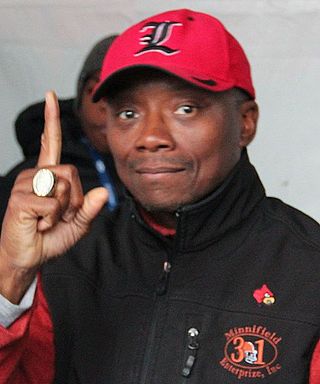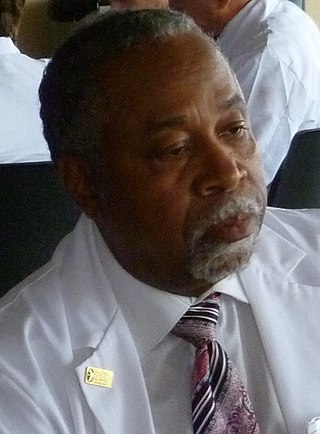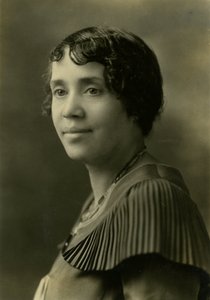Related Research Articles
The Carmel Indians are a group of Melungeons who lived in Magoffin County, Kentucky and moved to Highland County, Ohio. Dr. Edward Price observed that the most common surnames among the families were Gibson, Nichols and Perkins. His research found that the ancestors of the group were listed as free people of color on census records. Paternal line descendants of Bryson Gibson and Valentine Collins who participated in the Melungeon DNA Project belong to Haplogroup E-M2. The group were listed as free Black and Mulatto in Kentucky prior to the American Civil War.

Frank LyDale Minnifield is an American former professional football player who was a defensive back for the Cleveland Browns in the National Football League (NFL) from 1984 to 1992. He played college football for the Louisville Cardinals.

Gerald Anthony Neal is an American politician and attorney. He is a Democratic Party member of the Kentucky Senate, representing District 33 since January 1989.
Abby Lindsey Marlatt, Ph.D. was a social justice activist and a teacher scholar committed to civic engagement. While a professor at the University of Kentucky (UK) in Lexington, Kentucky, she became the center of controversy at UK in the mid-1960s over anti-war protests and whether the university could censor her in her role as a public intellectual. She was honored for her work by many academic, professional and community organizations including the National Conference for Community and Justice, and she was inducted into the Kentucky Civil Rights Hall of Fame in 2001.
Suzanne Post was a civil rights activist in the struggle against discrimination and social injustice in Kentucky. She was born to Morris and Betty Kling in Louisville, Kentucky on March 19, 1933. She joined a student branch of the National Association for the Advancement of Colored People while a student at Indiana University, and continued her student activism at the University of California Berkeley. In her long career, she advocated for social justice and led the way in the battle for civil rights, women's rights, LGBTQ rights, and equity in housing and education. Her Uncle Arthur Kling helped found the Kentucky Civil Liberties Union in 1955 and served on the Board of the Louisville Urban League. Michael Aldridge, a former ACLU director, in an article for the Louisville Courier Journal, wrote "the Kling family 's own personal experience with bigotry, and a shared memory of historic oppression and violence, made them fight all prejudice and restrictions on the civil liberties of others".

Elizabeth Beatrice Cooke Fouse was a woman from Kentucky, dedicated to gaining equality for African American women on both local and national levels. She founded as well as became the head of many organizations, with the ultimate goal of ending discrimination. Her Christian faith was critical to her activities in social and church-related clubs.

Audrey Louise Grevious became one of the central leaders in the local civil rights movement in Lexington and the Commonwealth of Kentucky.
The West End Community Council in Louisville, Kentucky, was an open housing organization that was founded in 1945 and remained active until 1970. This group became a broad human rights group with the help of its first executive director, Hulbert James. The women in the organization battled throughout the scare tactics imposed by white residents in segregated parts of Louisville in the 1960s.
Helen Fisher Frye, educator and active churchwoman, was a local leader for civil rights in her hometown of Danville, Kentucky, serving as the president of the Danville chapter of the NAACP. She was the first African American to enroll at Centre College and the first African American woman to receive a Master of Arts in Library Science from the University of Kentucky in 1960.
The Kentucky Athletic Hall of Fame is a sports hall of fame for the U.S. state of Kentucky established in 1963. Individuals are inducted annually at a banquet in Louisville and receive a bronze plaque inside Louisville's Freedom Hall. The Kentucky Athletic Hall of Fame other wise known as the Kentucky Sports Hall of fame, is a non-profit organization funded by the Kentucky Lottery and owned and operated by the Louisville Sports Commission.
Kinkeadtown is a historically African American section of Lexington, Kentucky. It was established near the home of George Blackburn Kinkead, several years after the American Civil War. The land was subdivided by Kinkead in 1870 and sold exclusively to African Americans. In 1880 it was populated by about 20 families and grew to include over 300 residents. Cities had growing populations of African Americans during the era. Kinkead's home is now the Living Arts and Science Center. An archaeological report on the area was published in 1996.
Vallateen Virginia Dudley Abbington was an African American activist, educator, and social worker. She is known for being the plaintiff in Abbington v. Board of Education of Louisville, where she fought for the equalization of teacher's salaries in Louisville, Kentucky.
Goodlowtown is a historically African American section of Lexington, Kentucky. It was named for William Cassius Goodloe.
Ruth Booker-Bryant (1923-2013) was an American social and human rights activist. Booker-Bryant was born in Detroit, Michigan in 1923 and lived in Kentucky before dying in 2013. She was known for her activism and work in civil rights, fair housing, and the fight for better housing conditions in Louisville. Booker-Bryant received many awards in her life, including the Carl and Anne Braden lifetime achievement award in 2011 and was also inducted into the Kentucky Civil Rights Hall of Fame. Booker-Bryant was also a Buddhist member of the Soka Gakkai International. She was married to Louisville civil rights activist, Roscoe C. Bryant Jr. who fought and became the first African-American physician on the Louisville and Jefferson County Board of Health.

Eleanor Young Love (1922–2006) was an African-American librarian from Kentucky. She was the daughter of Whitney Young and the sister of Whitney Young Jr. She worked at the Lincoln Institute., an all-black boarding high school in Lincoln Ridge, KY, formed when schools were segregated in Kentucky., where her father was president. She received her degree from Atlanta University, now Clark Atlanta University, her M.Ed. from the University of Louisville, and her D.Ed. from the University of Illinois.
African-American neighborhoods in Lexington, Kentucky were established after the Civil War.
Frank L. Stanley Sr. was an American newspaper publisher and editor. Stanley co-founded and became sole publisher of The Louisville Defender, the city's leading Black newspaper that he led for 38 years. The Louisville Defender published in the face of regular threats and attacks, persevering under Stanley's belief that "racism is not insoluble." Stanley was general president of Alpha Phi Alpha and a civil rights activist. He drafted the resolution that led to desegregation of higher education in Kentucky, and chaired desegregation committees for the U.S. Secretary of War. Stanley was selected twice as a juror for the Pulitzer Prize Award committee.
Charles W. Anderson Jr. was a lawyer, state legislator and civil rights leader in Kentucky. He served in the Kentucky House of Representatives from 1935 until 1946.
Atkinson Literary and Industrial College was in Madisonville, Kentucky. It was established by Bishop Alexander Walters and the African Methodist Episcopal Zion Church. It opened in 1894.
References
- ↑ "NAACP | What is the Mission of the NAACP?". NAACP. Retrieved 2019-07-29.
- ↑ "Kentucky State Conference NAACP - Strengthening State Branches". www.kynaacp.org. Retrieved 2019-06-03.
- ↑ "Abbington v Board of Education of Louisville (KY) · Notable Kentucky African Americans Database". nkaa.uky.edu. Retrieved 2019-06-03.
- ↑ For more see Papers of the NAACP, Part 3, The Campaign for Educational Equality: Legal Department and Central Office Records, 1913–1950 / Series B, 1940–1950 / Reel 8; see "Kentucky Cases" in The Negro Handbook 1946–1947, edited by F. Murray; "Alumna, 96, remembered as strong-willed activist," Exemplar (Eastern Michigan University), Winter 2004, Special Annual Report Issue; and "Vallateen Abbington, social worker, civic leader," St. Louis Post-Dispatch, 10/19/2003, Metro section, p. D15. See also Hardin, John A. Fifty Years of Segregation: Black Higher Education in Kentucky, 1904–1954. Lexington: University Press of Kentucky, 1997. Print.
- ↑ Jet. Johnson Publishing Company. 1966-10-27.
- ↑ "Crumlin, James A., Sr. · Notable Kentucky African Americans Database". nkaa.uky.edu. Retrieved 2019-06-03.
- ↑ Anna Frances Eilers (now Anna Anderson), Appellant, v. George F. Eilers, Appellee, Court of Appeals of Kentucky, 412 S.W.2d 871: 1967 Ky, March 17, 1967. See the "Eilers v. Eilers" entry in the Notable Kentucky African Americans Database, University of Kentucky Libraries, Lexington, Kentucky.
- ↑ See more on this in Parents Involved in Community Schools v. Seattle School District No. 1, Meredith v. Jefferson County Board of Education and John E. Kleber's The Encyclopedia of Louisville.
- ↑ Audrey Grevious, president of the local NAACP chapter in Lexington, was featured in "Living the Story: The Civil Rights Movement in Kentucky," Kentucky Educational Television: Education, Public Affairs, Arts and Culture, Online Video. Ed. Betsy Brinson, Tracy K'Meyer, Arthur Rouse, and Joan Brannon. Kentucky Oral History Commission, 2001. Accessed 16 September 2010. This video requires RealPlayer - if you need help, see the KET RealPlayer Help Page. See also the transcript of the oral history interview by Betsy Brinson with Audrey Grevious on April 13, 1999, catalog no. 21 E 17, "Civil Rights Movement in Kentucky Oral History Project," Kentucky Historical Society, 2000. Accessed 16 September 2010. http://205.204.134.47/civil_rights_mvt/media/KCRP.20.B.21.Grevious.pdf Archived 2011-07-04 at the Wayback Machine .
- ↑ "Browse Items · Notable Kentucky African Americans Database". nkaa.uky.edu. Retrieved 2019-08-13.
- ↑ "Civil Rights Movement in Kentucky". Archived from the original on 2011-07-04. Retrieved 2010-11-29.
- ↑ "Burroughs, Olive · Notable Kentucky African Americans Database". nkaa.uky.edu. Retrieved 2019-06-03.
- ↑ Bracey, John H. "Papers of the NAACP." Lexus Nexus. University Publications of America. Accessed 29 November 2010. lexisnexis.com
- ↑ "Craft, Rebecca · Notable Kentucky African Americans Database". nkaa.uky.edu. Retrieved 2019-06-03.
- ↑ "Jones, Daisy · Notable Kentucky African Americans Database". nkaa.uky.edu. Retrieved 2019-06-03.
- ↑ "Liggin, Jennie B. · Notable Kentucky African Americans Database". nkaa.uky.edu. Retrieved 2019-06-03.
- ↑ "Williams, Frances Harriet · Notable Kentucky African Americans Database". nkaa.uky.edu. Retrieved 2019-06-03.
- ↑ "2010". Kentucky Commission on Human Rights. Retrieved June 8, 2022.
- ↑ http://www.lexnaacp.org/ [ dead link ]